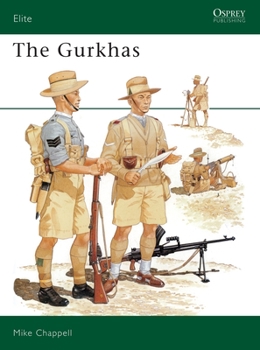The Gurkhas
(Book #49 in the Osprey Elite Series)
The origins of the Gurkhas date back to 1815, when one of the most skilled and determined opponents that the British soldier had to overcome in battle was the Nepalese warrior. The British were so impressed with the military skills of these fighters that they began recruiting units exclusively from Nepal. From this beginning grew the now famous Gurkha units. This volume examines the development of the Gurkhas through the various wars and confrontations of the 19th century, through the First World War (1914-1918), Second World War (1939-1945), and the various postwar conflicts including Malaya, Borneo and the Falklands.
Format:Paperback
Language:English
ISBN:1855323575
ISBN13:9781855323575
Release Date:September 1993
Publisher:Osprey Publishing (UK)
Length:64 Pages
Weight:0.45 lbs.
Dimensions:0.2" x 7.3" x 9.6"
Customer Reviews
1 rating
Typical Handy Review
Published by Thriftbooks.com User , 23 years ago
There are few literate people in the world who have not heard of the Gurkhas, the legendary fighting men from Nepal, a steep country of hill people of Asiatic ancestry. For over a century and a half the soldiers recruited from the Himalayas on the southern face of the range overlooking India faithfully served in the British Indian Army and since the independence of India form one of the largest contingents of the Army of India today. They still serve faithfully the British crown but with retrenchment and reductions their units are fading out of existence. This book briefly covers the history of the Gurkhas and reviews the current units in British service. Those units in the Army of India are not. Do not confuse the Army of India (post 1947) with the Indian Army of the British Empire which was divided up in 1947 to form both the Army of India and the Army of Pakistan.Their reputation for fierceness in battle is well deserved as is their cheery disposition and love for the tasks of a soldier. Of course, not being citizens or subjects of the nations they serve, they are characterized as mercenaries. Unfortunately that name has recieved much undeserved opprobium in the last forty some years due to the excesses of those who served in fight for pay units in the Congo and other places in Africa but those persons should more properly be termed "soldiers of fortune" as were those in the early part of the twentieth century. Those men were essentially amoral who killed for a living and put their life on the line for a big payoff in loot or cash so that they could squander it on rioutous libertinous living until the money ran out. A mercenary is really someone who earns his living at soldiering in the service of a nation not his own. No one in the French Foreign Legion ever got rich in the ranks, but they are mercenaries. In the mid millenium there were many such men. Sir John Falstaff, the Shakespearian character in Henry V, was one such. Dutch, Swedish, and Swiss have long been mercenaries. The famous Swiss Guard of the Vatican is a current example.So honor the Gurkhas for the jolly fellows they are and the virtues they personify, loyalty, steadfastness in adversity, and athletic courage, and forget unjust stereotypes of pillage and rapine properly attributed to mercenaries-soldiers of fortune of other times and places.






